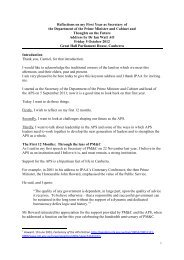Cabinet Handbook - The Department of the Prime Minister and ...
Cabinet Handbook - The Department of the Prime Minister and ...
Cabinet Handbook - The Department of the Prime Minister and ...
You also want an ePaper? Increase the reach of your titles
YUMPU automatically turns print PDFs into web optimized ePapers that Google loves.
<strong>Cabinet</strong> authority<br />
24. <strong>Minister</strong>s must carry out <strong>Cabinet</strong>-determined policies with respect to <strong>the</strong>ir own ministries,<br />
whe<strong>the</strong>r or not <strong>the</strong>y agree with such policies. <strong>Minister</strong>s (<strong>and</strong> portfolio agencies) must act on <strong>Cabinet</strong><br />
decisions as recorded in <strong>Cabinet</strong> minutes.<br />
25. Where a policy has been considered by <strong>the</strong> <strong>Cabinet</strong>, ministers must not announce that new policy<br />
or changes to a policy without <strong>the</strong> <strong>Cabinet</strong>’s approval (for guidance on approval <strong>of</strong> minor policy changes<br />
see Annex B – Managing <strong>the</strong> <strong>Cabinet</strong> business).<br />
<strong>Minister</strong>ial responsibility<br />
26. <strong>The</strong> key responsibilities <strong>of</strong> ministers in <strong>the</strong> <strong>Cabinet</strong> relate to upholding <strong>the</strong> principles <strong>of</strong> collective<br />
responsibility <strong>and</strong> <strong>Cabinet</strong> solidarity.<br />
27. <strong>Minister</strong>s must:<br />
(a) not only refrain from publicly criticising <strong>Cabinet</strong> decisions, but also defend <strong>the</strong>m publicly, or else<br />
resign;<br />
(b) not announce a major new policy without previous <strong>Cabinet</strong> approval;<br />
(c) not express private views on government policies nor speak about or o<strong>the</strong>rwise become<br />
involved in a ministerial colleague’s portfolio without first consulting that colleague <strong>and</strong> possibly<br />
<strong>the</strong> <strong>Prime</strong> <strong>Minister</strong>; <strong>and</strong><br />
(d) underst<strong>and</strong> that government advice to <strong>the</strong> Governor-General is assumed to be unanimous.<br />
28. <strong>The</strong> <strong>Cabinet</strong> principles <strong>and</strong> conventions also apply to <strong>the</strong> whole Ministry, not simply those<br />
ministers in <strong>Cabinet</strong>.<br />
Individual ministerial responsibility<br />
29. Some ministerial posts have responsibility for certain statutory functions that are exercised by <strong>the</strong><br />
individual minister <strong>and</strong> not through <strong>Cabinet</strong> (see Annex B – Managing <strong>the</strong> <strong>Cabinet</strong> business).<br />
30. <strong>Minister</strong>s should, however, inform <strong>the</strong> <strong>Cabinet</strong> <strong>of</strong> any exercise <strong>of</strong> an individual statutory power<br />
that merits <strong>Cabinet</strong>-level attention. Informing <strong>the</strong> <strong>Cabinet</strong> <strong>of</strong> <strong>the</strong> intended decision <strong>and</strong> <strong>the</strong> basis for that<br />
decision enables <strong>the</strong> minister’s colleagues to defend that decision publicly <strong>and</strong> collectively.<br />
31. If ministers are unsure about whe<strong>the</strong>r to bring an issue concerning <strong>the</strong> exercise <strong>of</strong> a statutory<br />
power or function to <strong>the</strong> <strong>Cabinet</strong>, <strong>the</strong>y should seek guidance from <strong>the</strong> <strong>Prime</strong> <strong>Minister</strong> or <strong>the</strong> <strong>Cabinet</strong><br />
Secretary.<br />
<strong>The</strong> <strong>Cabinet</strong> Secretary<br />
32. <strong>The</strong> <strong>Prime</strong> <strong>Minister</strong> may appoint a <strong>Cabinet</strong> Secretary to manage <strong>the</strong> flow <strong>of</strong> business to <strong>the</strong><br />
<strong>Cabinet</strong> <strong>and</strong> determine <strong>the</strong> forward <strong>Cabinet</strong> <strong>and</strong> <strong>Cabinet</strong> committee program.<br />
33. <strong>The</strong> <strong>Cabinet</strong> Secretary generally attends all meetings <strong>of</strong> <strong>the</strong> <strong>Cabinet</strong> <strong>and</strong> <strong>the</strong> <strong>Cabinet</strong> committees<br />
(o<strong>the</strong>r than <strong>the</strong> Parliamentary Business Committee <strong>of</strong> <strong>Cabinet</strong>) <strong>and</strong> is responsible for <strong>the</strong> smooth<br />
running <strong>of</strong> meetings <strong>and</strong> for authorising <strong>the</strong> record <strong>of</strong> decisions (<strong>the</strong> <strong>Cabinet</strong> minutes). This includes<br />
responsibility for advising <strong>the</strong> <strong>Prime</strong> <strong>Minister</strong> on all questions connected with <strong>the</strong> appointment <strong>and</strong><br />
organisation <strong>of</strong> <strong>Cabinet</strong> committees, including membership <strong>and</strong> terms <strong>of</strong> reference.<br />
11




